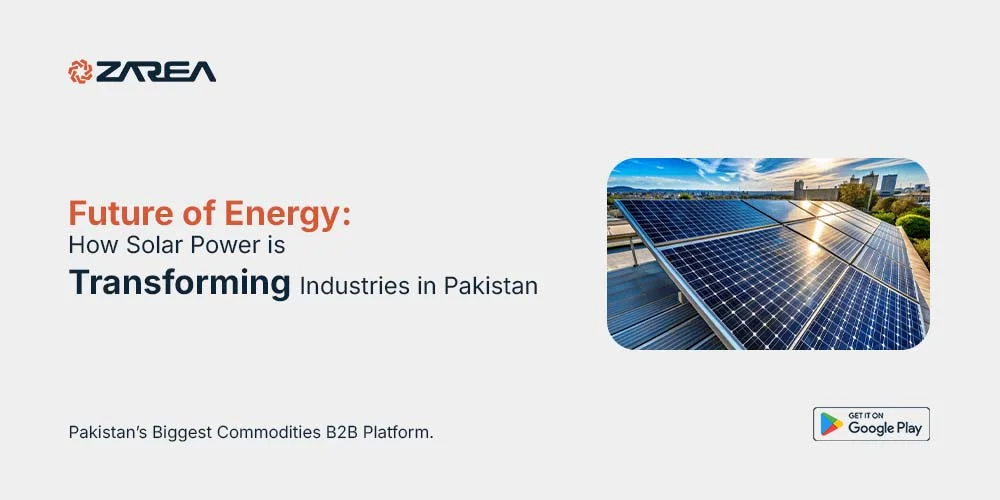Introduction – Future of Energy:
In recent years, Pakistan has embarked on a crucial shift towards an environmentally sustainable and economically practical energy landscape. Growing interest and investment in solar energy represent not merely a trend, but a significant advancement toward energy security and environmental sustainability. This initiative is expected to transform sectors nationwide, minimizing carbon emissions and reinforcing the nation’s status in the area of energy self-sufficiency.
At Zarea, we hold a strong belief in the changing potential of renewable energy. Our dedication extends past delivering cutting-edge construction materials; we additionally provide inventive solar solutions tailored to satisfy various client requirements.
What is Solar Power?
Solar energy captures the sun’s power to produce electricity, mainly through photovoltaic (PV) cells that transform sunlight straight into electrical energy. It signifies a sustainable substitute for conventional energy sources, leading the way in future energy solutions with assurances of decreased environmental effects and reduced energy expenses.
If you seek a more thorough grasp of solar technologies, consider checking out our blog on the “Fundamentals of Solar Panels.”
The Solar Energy Revolution in Pakistan:
The increase in solar energy utilization in Pakistan signifies an important change in the nation’s energy framework. A growing number of consumers are opting for solar solutions as the prices of solar panels drop and electricity costs continue to climb. Nonetheless, this swift change has ignited debate. Policymakers are split on how to best handle this transition, particularly as the government encounters economic impacts from decreased demand for conventional grid-based electricity and higher idle capacity costs.
The government’s indecision is evident in ongoing delays related to the ‘Solar Panel Local Manufacturing and Allied Equipment’ policy, underscoring a larger discussion about whether to promote or regulate the growing solar industry. Conflicting signals from recent measures to remove import tariffs on raw materials for local solar manufacturing highlight these intricacies.
To gain a wider view of solar energy’s role in sustainability, take a look at our comprehensive study in “Solar Energy in Pakistan.”
Types of Solar Energy Systems:
Solar energy systems include:
- Photovoltaic Systems: These transform sunlight directly into electricity through panels composed of semiconductor materials.
- Concentrated Solar Power (CSP): This technology employs mirrors to focus sunlight, creating heat that powers a steam turbine to generate electricity.
These systems highlight the flexibility of solar energy and its significance in the future of global energy.
Benefits of Solar Energy in Pakistan:
Embracing solar energy in Pakistan provides a variety of advantages:
- Cost Efficiency:
- Energy Independence:
- Environmental Sustainability:
- Economic Opportunities:
For an extensive overview of the solar technologies offered, look into “Everything You Should Understand About Solar Panels in Pakistan.”
The Future of Energy:
As we consider the future of energy sources worldwide, it is evident that solar energy will take the lead. Forecasts suggest that by the year 2050, anywhere from 65 to 80 percent of global electricity generation will originate from low-carbon sources. This shift corresponds with global trends and indicates the rising investments in renewable technologies to sustainably address growing energy needs.
The Role of Zarea in the Solar Energy Revolution:
As a leading B2B e-commerce platform, Zarea is uniquely positioned to facilitate the solar energy transformation in Pakistan. Specializing in connecting businesses with suppliers, Zarea offers an extensive range of products, including advanced solar energy solutions. This platform serves as a vital link for businesses of all sizes, providing access to essential solar components such as photovoltaic panels, inverters, and other renewable technologies.
Zarea’s extensive network and robust supply chain capabilities enable effective solutions for integrating solar power into mainstream energy systems, thus accelerating Pakistan’s transition to a renewable energy-based economy.
Conclusion:
Solar power is not an alternative source in Pakistan but a transformation force that reshapes the way energy has been produced in the country and contributes toward a sustainable future. Where industries are still on the go toward solar power, a shift in trend is expected to take place in the dynamics of its production and consumption in Pakistan.
Continued investment and increased adoption of the technology of solar energy mean nothing but energy security, opening ways to economic stability and environmental sustainability for Pakistan and beyond.
FAQ’s:
What is the future of energy options?
Renewable energy sources such as solar, wind, biomass, and hydro are poised to define the future energy landscape because of their limited environmental footprint and low waste production.
What will energy look like in 2050?
It is expected that by 2050, oil and natural gas will continue to be important energy resources. Nevertheless, the worldwide energy mix will progressively lean towards lower-carbon alternatives, characterized by a significant increase in renewables and a related decrease in coal consumption.

































